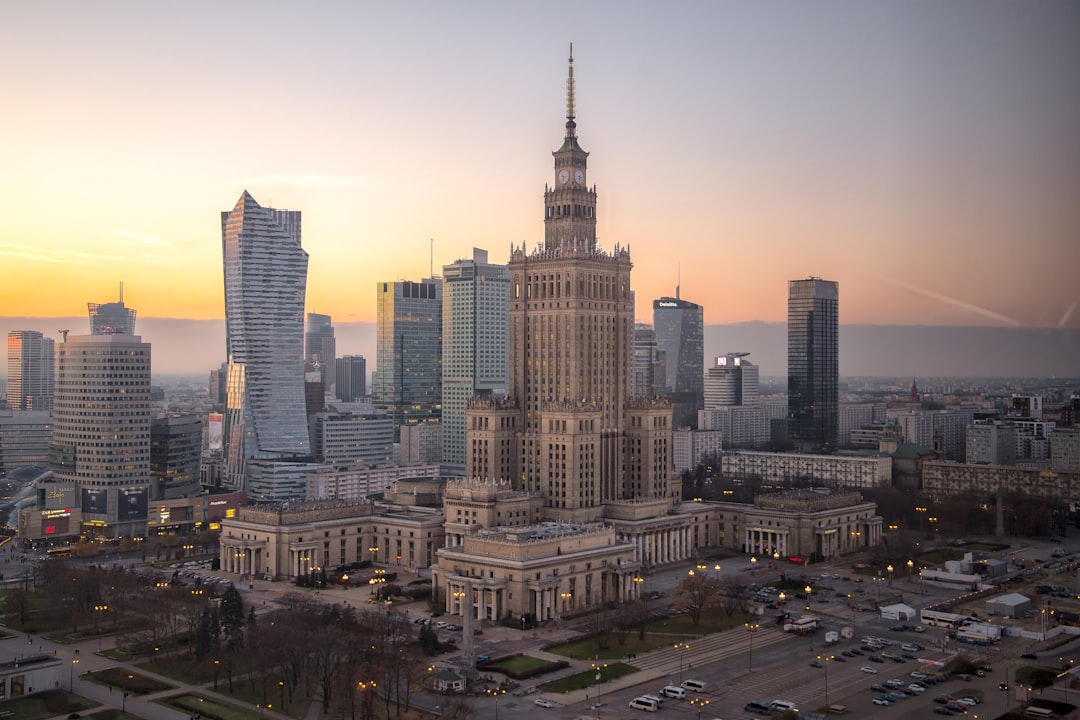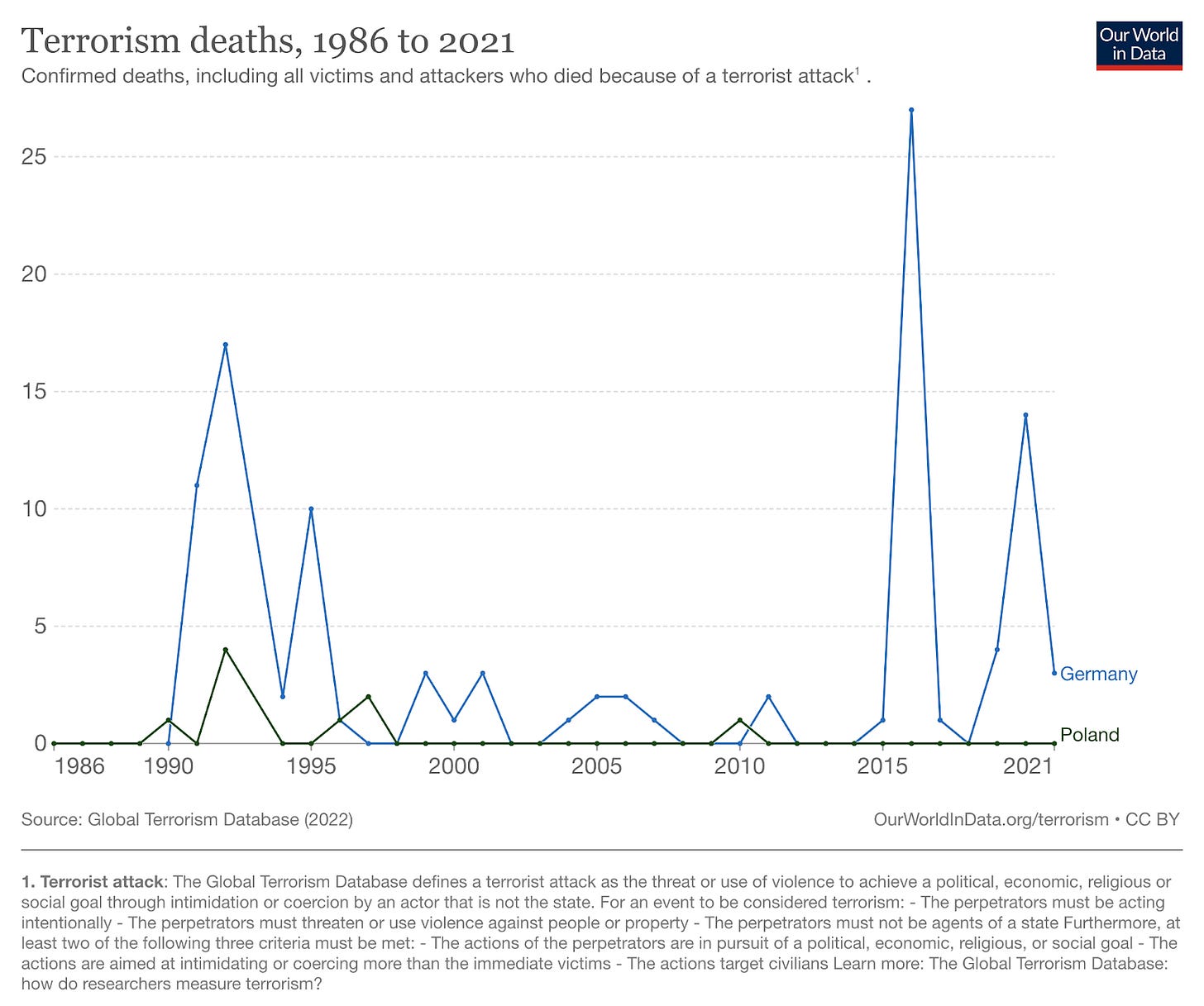Poland vs Germany: How They Really Compare on Jobs, Safety and Growth
Taking a closer look at the data to ask whether Warsaw's conservative politics or Berlin's more liberal direction is more successful.

Many people wonder how Poland and Germany really compare on economic performance, crime and migration outcomes. Warsaw has lower unemployment and rapid GDP growth, while Berlin has a more diverse labour market and higher life satisfaction — but what do the data actually show? This article breaks down the numbers and examines the myths often used in political debates on both sides.
Is Poland safer than Germany?
A friend recently sent me an outtake of a speech by an MEP for Poland’s ruling Law and Justice Party in which he made the argument that Poland is a much safer, better-functioning country than its western European neighbours thanks to the fact that it doesn't have any illegal immigration.
“The EU state with the lowest unemployment is Poland, the highest GDP after Covid in the EU is Poland, one of lowest debts is Poland’s. So don't give us this rubbish about the need for educated immigration. We don't need your doctors, we don't need your engineers, take them all and pay for them. You know why? Because there are zero terrorist attacks in Poland. You know why? Because there is no illegal immigration in Poland,” said conservative MEP Dominik Tarczyński.
The speech picked up on two dominant themes in the highly emotional debate around migration that has re-emerged in recent weeks.
The first one is the claim that migration makes countries less safe. This assertion is mainly based around the fact that migrants are often Muslims - and thus Islamist terrorism could become more of an issue - or that young men are disproportionately likely to migrate illegally to Europe. Young males, as all insurers and evolutionary biologists will tell you, are disproportionately likely to do stupid, aggressive things.
The second claim is one made in defence of migration - that Europe needs it in order to maintain economic growth, and to fill holes in its labour market.
Putting arguments about humanitarian obligations to one side, I thought it would be fun to compare some stats on Germany and Poland to see whether we can get any closer to the truth.
Advertisement:
Of course, before we get started, sticking two sets off statistics next to each other is often highly misleading. That said, Germany vs. Poland does seem to be a legitimate comparison to try and assess the burning hot potato of whether high levels of migration are broadly a good or bad thing for a country.
The number of migrants as a share of the total Polish population has quite incredibly gone down over the past three decades, while in Germany it has shot up. While 15 percent of the German population were born elsewhere, less than two percent of the Polish population are of foreign birth (based on statistics from before the Ukrainian war.)
So, it is pretty clear that Poland is still a largely homogenous society populated by “the Polish people” while Germany is an increasingly multi-ethnic society with various languages and national and cultural identities living in the same place.
What is the effect?
Let’s start with Mr Tarczyński’s claims about terrorism.
It is clearly true that there are both more terrorist attacks in Germany and that more people die in terror attacks than in Poland. However the data from Germany also includes attacks by white Germans on migrants. Additionally, the number of people who die due to terrorism in Germany is dwindling small compared to the overall number of deaths in any given year.
But what about violence more generally? Is Germany a more dangerous place than an immigrant-free country like Poland, as Europe’s far-right would have us believe?
This age-standardised graph shows that Germany still has a lower homicide rate than Poland - and in fact Germany’s homicide rate has continued to fall while levels of migration have risen sharply.
The massive decline in Poland’s own homicide rate would suggest that other factors such as economic or democratic development might be more important than a country’s ethnic make up.
Figures collected by the EU show that the level of reported theft in Germany is much higher than the numbers coming out of Warsaw. A closer look shows, though, that theft in Germany has dropped off markedly since the refugee crisis of 2015.
Ask the German police and they will tell you that part of the reason that theft has gone down in Germany is that they have taken more effective measures against foreign burglars and car jackers entering the country… from Poland.
Poland also has a much higher prison population than Germany, perhaps indicating higher levels of crime in general. These figures could, of course, also be proof of a more draconian justice system.
What about the other side of the argument? Are higher levels of migration good for economic growth? Again, the answer to this question is not a simple one and no one chart can do it justice.
What we can at least say, though, is that having a near-zero immigration policy hasn’t had an obviously destructive impact on the Polish economy. Far from it, Warsaw has recorded much stronger growth than Berlin during this century and is now approaching the level of wealth Germany enjoyed during the 1990s.
It is also true that Poland has one of the lowest public debt ratios in the EU, as well as having one of its lowest unemployment rates. Overall it is hard to make the argument that Warsaw has not made a success of its economy since shedding the straight jacket of communism three decades ago.
One interesting figure that stood out to me, though, was how much harder Poles have to work than other Europeans per dollar in their economy. The average Pole works 600 hours more in a year than a German for a smaller end result.
It is probably worth keeping in mind that Poland has a slightly younger population than Germany and has not yet been hit by the “demographic time bomb” of an unsustainably low birth rate (which it also has) - which has left Germany with too few workers to pay for all those pensioners’ pensions.
What about Mr Tarczyński’s claim that western Europe should “keep all the doctors” coming from abroad? Well, Eurostat figures show that Germany had almost twice the number of doctors per head of population that Poland had in 2017. Since then, Warsaw has stopped sharing those numbers with Brussels.
That lack of medical staff might have something to do with Poland having one of the lowest life expectancies in the EU…

But what about the most fundamental question of all? Are Poles happier in their country where physicians are almost as rare as foreigners, and where you need to put in a Victorian shift before seeing your family in the evening? Or have Germans made the better deal?
Well, the life satisfaction metrics collected by Brussels attempt to answer this question. And the winner is: Poland, where 36 percent of the population report high life satisfaction, compared to 28 percent in Germany.
Maybe immigration plays some role in influencing life satisfaction. Or maybe it’s the fact that Poland remains the second cheapest country in the EU to buy a pack of cigarettes (€3,22 vs €6.18 in Germany).
Who knows?













What a disgusting chauvinist article. Maybe we have to work more because your country plundered, looted and mass murdered my country and to this day refuses to take accountability for it and pay reparations?
Your country never had communism and instead got the Marshall plan and had the US rebuild everything for you whilst we got plunged into communism and poverty.
Shame on the author for such a disgusting article jesting at the deaths of millions and of the holocaust.